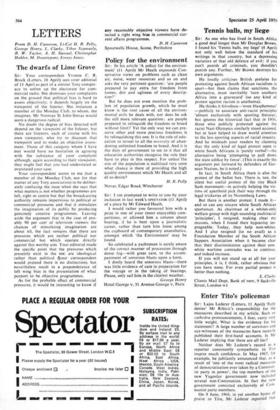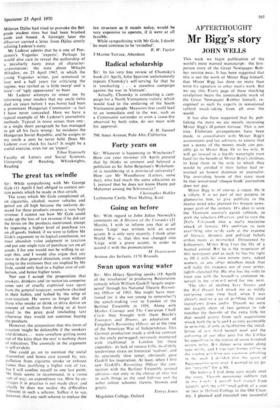Enter Tito's policeman
Sir: Lajos Lederer (Letters, 11 April) 'flatly denies' Mr Ribicic's responsibility for the massacres described in my article. Such ex cathedra pronouncements, I fear, carry very little weight. What is the evidence for his statement? A large number of survivors and eye-witnesses of the massacres have recently published their first-hand accounts. Is Mr Lederer implying that these are all lies?
Neither does Mr Lederer's record as a reporter consistently sympathetic to Tito inspire much confidence. In May 1967, for example, he jubilantly announced that, as a result of 'one of •the most radical measures of democratisation ever taken by a Commun- ist party in power', the top members of the new Yugoslav government now included several non-Communists. In fact the new government consisted exclusively of Com- munist party members.
On 9 June, 1968, in yet another hymn of praise to Tito, Mr Lederer reported that Milovan Djilas had tried to provoke the Bel- grade student riots but had been brushed aside and booed. A fortnight later the Observer carried a letter from Djilas utterly refuting Lederer's story.
Mr Lederer admits that he is one of Pen- dennis's Yugoslav 'experts'. Perhaps he would also care to reveal the authorship of a peculiarly nasty piece of character- assassination: the note about Mihajlo Mihajlov, on 23 April 1967, in which the young Yugoslav writer, just sentenced to four and a half years for criticising the regime, was reviled as 'a little twerp' and 'a bore'—of 'ugly appearance' to boot.
Mr Lederer attempts to smear me by informing your readers that my uncle (who died six years before I was born) had been a prominent Hungarian Communist—a fact I have never concealed. Here we have a typical example of Mr Lederer's journalistic methods. Typical in more senses than one: in a single short paragraph he has managed to get all his facts wrong: he misdates the Hungarian Soviet Republic, and he assigns to my uncle a post he never held. Does Mr Lederer ever check his facts? It might be a useful exercise, even for an 'expert'.
Tibor Szamuely Faculty of Letters and Social Sciences, University of Reading, Whiteknights, Reading







































 Previous page
Previous page